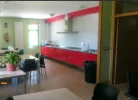In 2019, we discovered that all the cooking utensils had been removed from all the municipal albergues in Galicia. No-one seemed to know why. Could be cost-cutting or could be pressure from local businesses, who knows. I'd be interested to hear any explanations (one hospi told it was because pilgrims kept nicking it - as if someone has walked 1000kms across Spain solely for the purpose of helping themselves to a 4 litre cooking pot). The microwaves and stoves are still there. So, if you want to self-cater, you'll need a billy + mug and spoon/fork. Total weight, if you buy from Decathlon, 375 grammes.
My experience of Xunta albergue kitchens in Galicia (Sept. 2019 Camino Sanabres) was mixed. For example:
Xunqueira de Ambía (municipal) - Barely adequate - A couple of pans. No cooking knife. Bowls but not plates etc..
Ourense (municipal) - Nothing. Nada.
It's particularly telling that there are comments on Gronze about the lack of equipment in Ourense dating back to the time when the albergue was newly opened. (Complaints also about the attitude of the hospitalero - and there's a whole nother discussion to be had about public sector employees etc. but that's for another forum).
It's inevitable that there is a loss of inventory in albergue kitchens over time - whether due to people taking items for their own use, or damaging them and throwing them away. There may be a grain of truth in the popular "blame" narratives - "thieving pilgrims" or "local businesses protecting themselves." But I suspect that these are isolated or localized problems, while there is a systematic problem with the way budgets work. There are strong lobbies to secure budgets for different kinds of construction (e.g. building conversions, new builds, path maintenance etc.), but there's no forcing factor to make money available to keep kitchens appropriately equipped.
By contrast, in a well run private hostel, loss of inventory is a cost of doing business. Owners budget for having to replace a few broken plates, damaged pans, and items that "disappear" over time and they keep facilities and equipment up to a standard to ensure that they receive positive reviews and repeat business.
What would act as a "forcing factor" to give the Xunta an incentive to address the issue of inadequate kitchen equipment? It's a good question. My old boss used to say "the people who feel the pain will find the solution," but right now the Xunta's main pain is probably how to keep albergues afloat with very low costs.
I think there might be some hints for solutions in the fact that the Xunta does a pretty good job of ensuring that every albergue has an adequate inventory of disposable sheets. I think there are a few things to think about -
- Hygiene regulations are a "forcing factor"
- The sheets are often provided by the hospitalero/a when the albergue fee is paid, so costs are covered and supply is controlled
There's more than one way to solve the issue, but every approach will have pros and cons.



























